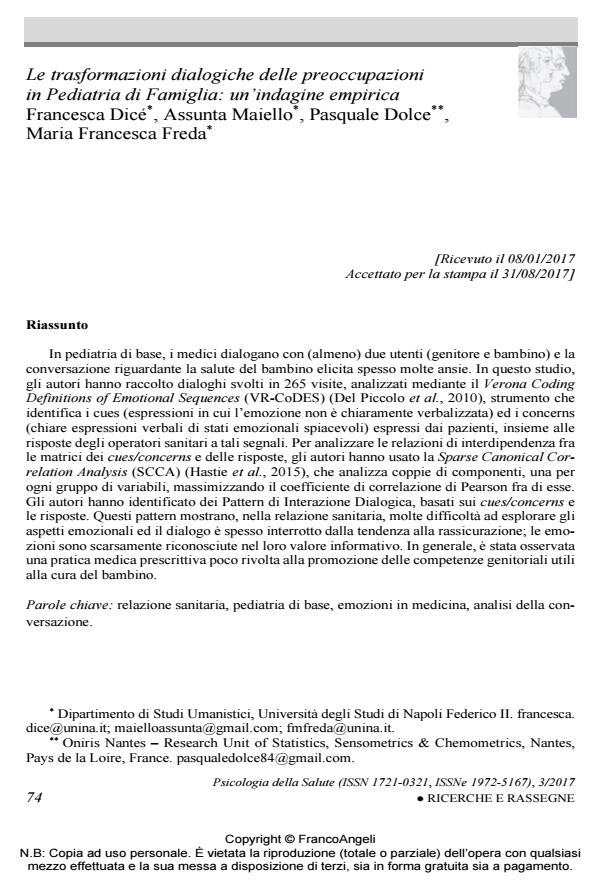Le trasformazioni dialogiche delle preoccupazioni in Pediatria di Famiglia: un’indagine empirica
Titolo Rivista PSICOLOGIA DELLA SALUTE
Autori/Curatori Francesca Dicé, Assunta Maiello, Pasquale Dolce, Maria Francesca Freda
Anno di pubblicazione 2017 Fascicolo 2017/3
Lingua Italiano Numero pagine 23 P. 74-96 Dimensione file 415 KB
DOI 10.3280/PDS2017-003004
Il DOI è il codice a barre della proprietà intellettuale: per saperne di più
clicca qui
Qui sotto puoi vedere in anteprima la prima pagina di questo articolo.
Se questo articolo ti interessa, lo puoi acquistare (e scaricare in formato pdf) seguendo le facili indicazioni per acquistare il download credit. Acquista Download Credits per scaricare questo Articolo in formato PDF

FrancoAngeli è membro della Publishers International Linking Association, Inc (PILA)associazione indipendente e non profit per facilitare (attraverso i servizi tecnologici implementati da CrossRef.org) l’accesso degli studiosi ai contenuti digitali nelle pubblicazioni professionali e scientifiche
In pediatria di base, i medici dialogano con (almeno) due utenti (genitore e bambino) e la conversazione riguardante la salute del bambino elicita spesso molte ansie. In questo studio, gli autori hanno raccolto dialoghi svolti in 265 visite, analizzati mediante il Verona Coding Definitions of Emotional Sequences (VR-CoDES) (Del Piccolo et al., 2010), strumento che identifica i cues (espressioni in cui l’emozione non è chiaramente verbalizzata) ed i concerns (chiare espressioni verbali di stati emozionali spiacevoli) espressi dai pazienti, insieme alle risposte degli operatori sanitari a tali segnali. Per analizzare le relazioni di interdipendenza fra le matrici dei cues/concerns e delle risposte, gli autori hanno usato la Sparse Canonical Correlation Analysis (SCCA) (Hastie et al., 2015), che analizza coppie di componenti, una per ogni gruppo di variabili, massimizzando il coefficiente di correlazione di Pearson fra di esse. Gli autori hanno identificato dei Pattern di Interazione Dialogica, basati sui cues/concerns e le risposte. Questi pattern mostrano, nella relazione sanitaria, molte difficoltà ad esplorare gli aspetti emozionali ed il dialogo è spesso interrotto dalla tendenza alla rassicurazione; le emozioni sono scarsamente riconosciute nel loro valore informativo. In generale, è stata osservata una pratica medica prescrittiva poco rivolta alla promozione delle competenze genitoriali utili alla cura del bambino.
Parole chiave:Relazione sanitaria, pediatria di base, emozioni in medicina, analisi della conversazione.
- Exploring emotions in dialog between health provider, parent and child. An observational study in pediatric primary care Francesca Dicé, Pasquale Dolce, Assunta Maiello, Maria Francesca Freda, in Pratiques Psychologiques /2020 pp.69
DOI: 10.1016/j.prps.2018.12.001 - Lo Scaffolding psicologico per la presa in carico delle condizioni Intersex/DSD. I Setting di Ascolto Congiunto Francesca Dicé, Maria Auricchio, Valentina Boursier, Raffaele De Luca Picione, Fabiana Santamaria, Mariacarolina Salerno, Paolo Valerio, Maria Francesca Freda, in PSICOLOGIA DELLA SALUTE 1/2018 pp.129
DOI: 10.3280/PDS2018-001008 - Sharing Medical Decisions with the Child. An Exploratory Survey in Paediatric Primary Care. Francesca Dicé, Pasquale Dolce, Assunta Maiello, Maria Francesca Freda, in Child Care in Practice /2024 pp.434
DOI: 10.1080/13575279.2021.1910488 - Relation between referential and reflexive processes: an explorative study Giovanna Esposito, Livia Savarese, Barbara Squitieri, in Counselling Psychology Quarterly /2019 pp.186
DOI: 10.1080/09515070.2018.1428528 - Caregivers’ Sensemaking of Children’s Hereditary Angioedema: A Semiotic Narrative Analysis of the Sense of Grip on the Disease Maria Francesca Freda, Livia Savarese, Pasquale Dolce, Raffaele De Luca Picione, in Frontiers in Psychology 2609/2019
DOI: 10.3389/fpsyg.2019.02609 - Gli Interventi Assistiti dagli Animali come processi di promozione della salute. Una review sistematica Francesca Dicé, Antonio Santaniello, Federica Gerardi, Alda Paoletti, Paolo Valerio, Maria Francesca Freda, Lucia Francesca Menna, in PSICOLOGIA DELLA SALUTE 3/2018 pp.5
DOI: 10.3280/PDS2018-003001 - The experience of living with a chronic disease in pediatrics from the mothers’ narratives: The Clinical Interview on Parental Sense of Grip on the Disease Livia Savarese, Maria Francesca Freda, Raffaele De Luca Picione, Pasquale Dolce, Raffaella De Falco, Maria Alessio, Mauro Cancian, Adriana Franzese, Maria Domenica Guarino, Roberto Perricone, Angelica Petraroli, Riccardo Senter, Claudia Traverso, Andrea Zanichelli, Eugenio Zito, Maria Bova, in Health Psychology Open 2055102920971496/2020
DOI: 10.1177/2055102920971496
Francesca Dicé, Assunta Maiello, Pasquale Dolce, Maria Francesca Freda, Le trasformazioni dialogiche delle preoccupazioni in Pediatria di Famiglia: un’indagine empirica in "PSICOLOGIA DELLA SALUTE" 3/2017, pp 74-96, DOI: 10.3280/PDS2017-003004